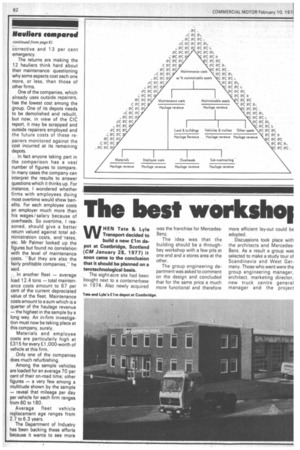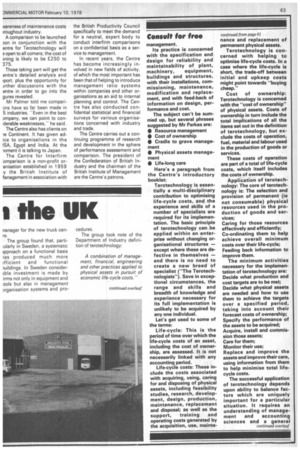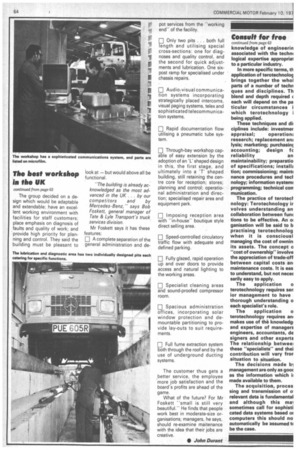The best workshol
Page 64

Page 65

Page 66

If you've noticed an error in this article please click here to report it so we can fix it.
WHEN Tate & Lyle Transport decided to build a new Elm depot at Coatbridge, Scotland (CM January 28, 1977) it soon came to the conclusion that it should be planned on a terotechnological basis.
The eight-acre site had been bought next to a containerbase in 1974. Also newly acquired was the franchise for MercedesBenz.
The idea was that the building should be a throughbay workshop with a few pits at one end and a stores area at the other.
The group engineering department was asked to comment on the design and concluded that for the same price a much more functional and therefore more efficient lay-out could be adopted.
Discussions took place with the architects and MercedesBenz. As a result a group was selected to make a study tour of Scandinavia and West Germany. Those who went were the group engineering manager, architect, marketing director, new truck centre general manager and the project nanager for the new truck cenre The group found that, parti:ularly in Sweden, a systematic ipproach on a functional basis as produced much more
)fficient and functional )uildings. In Sweden considerible investment is made by .irms not only in equipment and .00ls but also in management Drganisat on systems and pro
cedures.
The group took note of the Department of Industry definition of terotechnology: A combination of Management, financial, engineering and other practices applied to physical assets in pursuit of economic life-cycle costs.'" The group decided on a design which would be adaptable and extendable; have an excellent working environment with facilities for staff customers; place emphasis on diagnosis of faults and quality of work; and provide high priority for planning and control. They said the building must be pleasant to look at — but would above all be functional.
"The building is already acknowledged as the most advanced in the UK . . . by our competitors and by Mercedes-Benz," says Bob Foskett, general manager of Tate & Lyle Transport's truck services division.
Mr Foskett says it has these features:
E A complete separation of the general administration and de pot services from the -working end" of the facility.
[i] Only two pits . . . both full length and utilising special cross-sections: one for diagnoses and quality control, and the second for quick adjustments and lubrication. One sixpost ramp for specialised under chassis repairs.
EI Audio-visual communication systems incorporating strategically placed intercoms, visual paging systems, telex and sophisticated telecommunication systems.
• Rapid documentation flow utilising a pneumatic tube system.
• Through-bay workshop capable of easy extension by the adoption of an shaped design in this, the first stage, and ultimately into a 'T' shaped building, still retaining the centre core for reception; stores; planning and control; operational administration and direction; specialised repair area and equipment park.
El Imposing reception area with "in-house" boutique style direct selling area.
• Speed-controlled circulatory traffic flow with adequate and defined parking.
• Fully glazed, rapid operation up and over doors to provide access and natural lighting to the working areas.
Specialist cleaning areas and sound-proofed compressor room.
• Spacious administration offices, incorporating solar window protection and demountable partitioning to provide lay-outs to suit requirements.
• Full fume extraction system both through the roof and by the use of underground ducting systems.
The customer thus gets a better service, the employee more job satisfaction and the board's profits are ahead of the game.
What of the future? For Mr Foskett ''small is still very beautiful." He finds that people work best in moderate-size organisations; managers, he says, should re-examine maitenance with the idea that their jobs are creative.
• John Durant












































































































